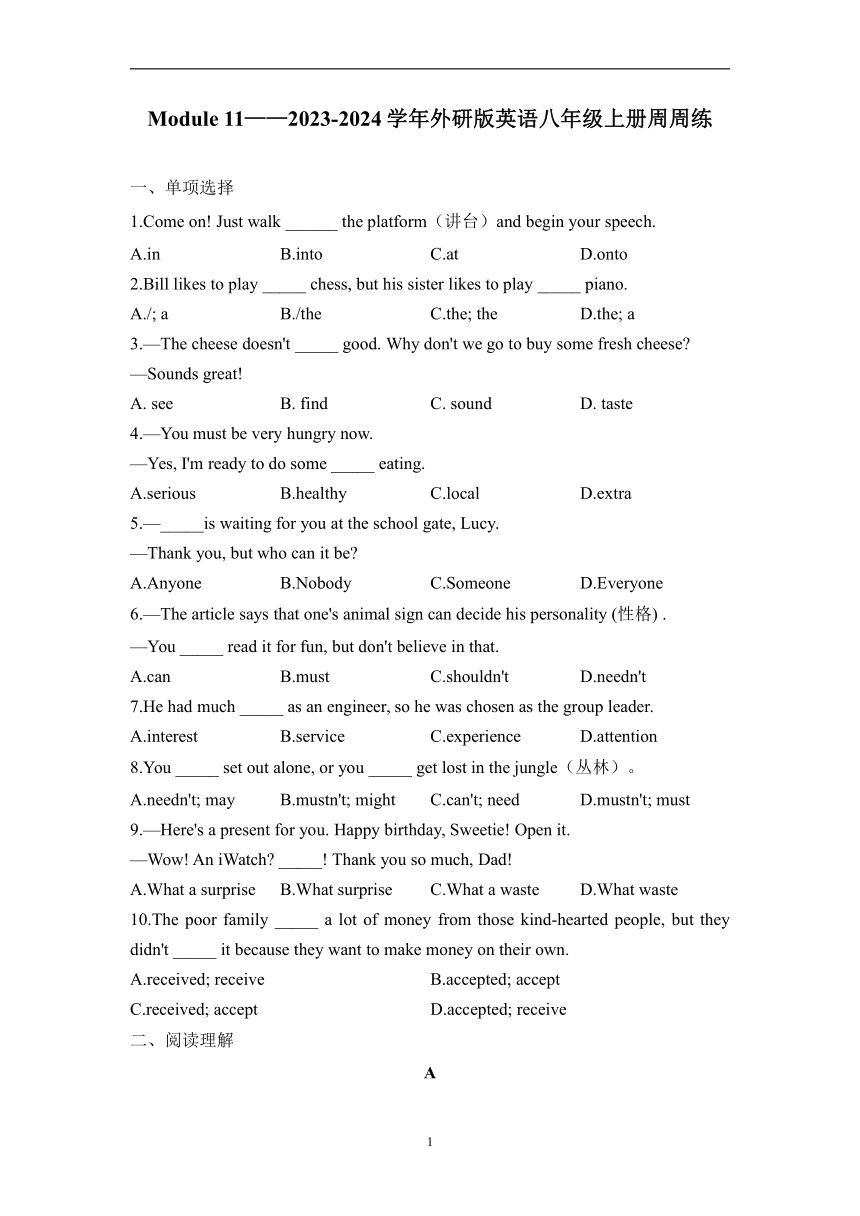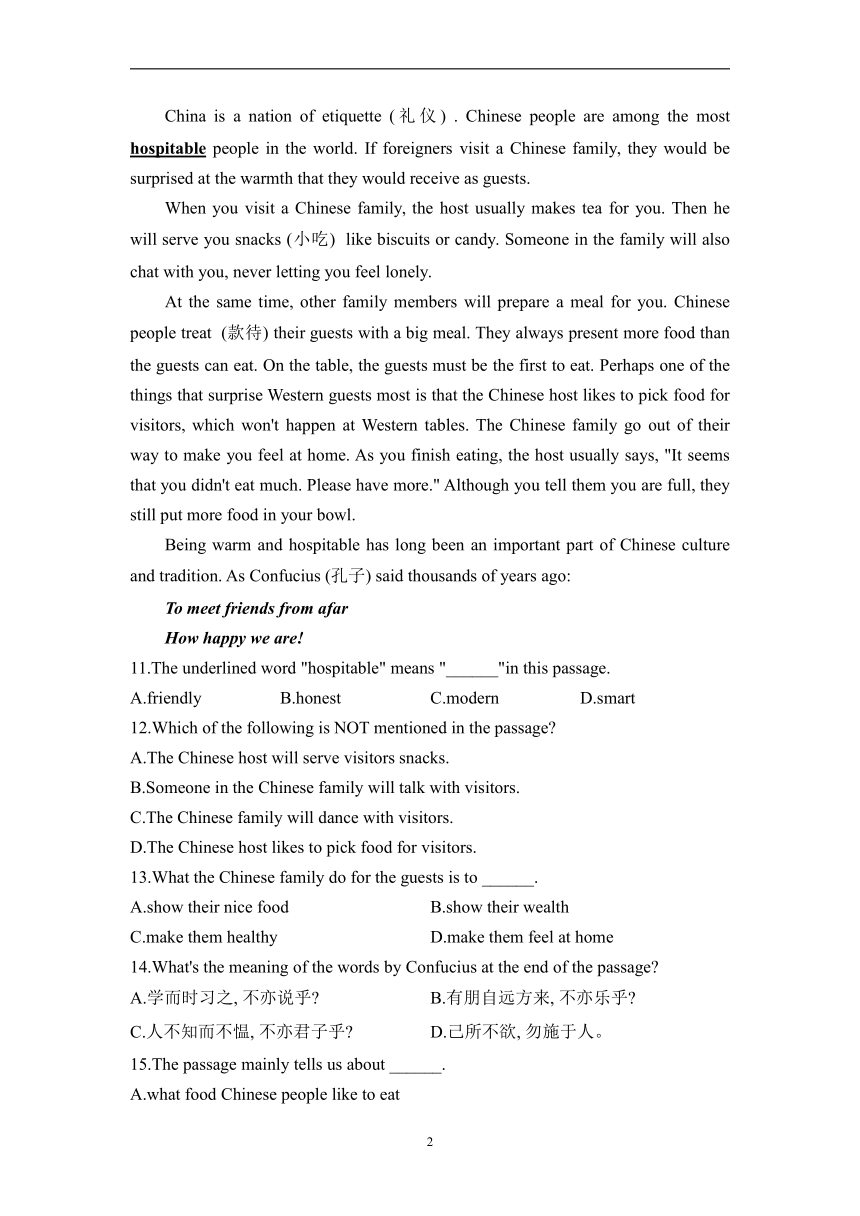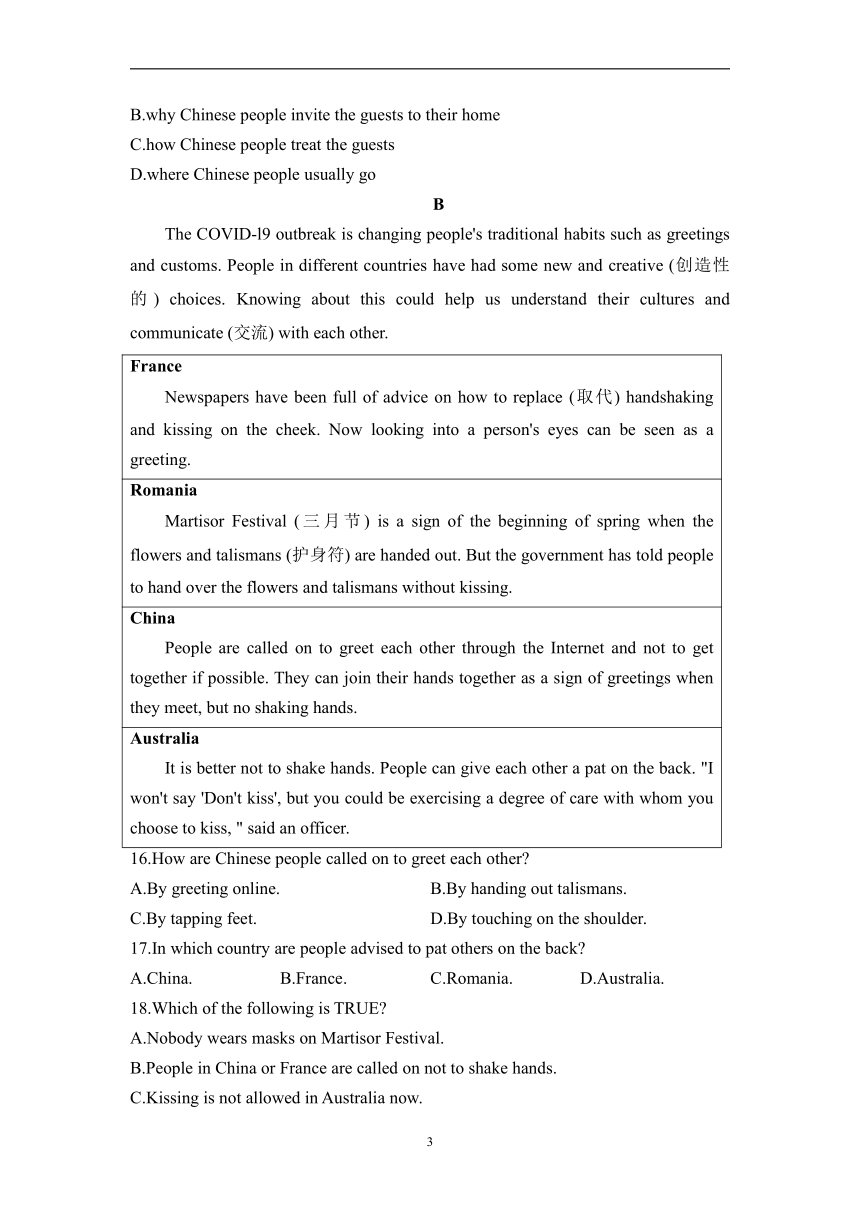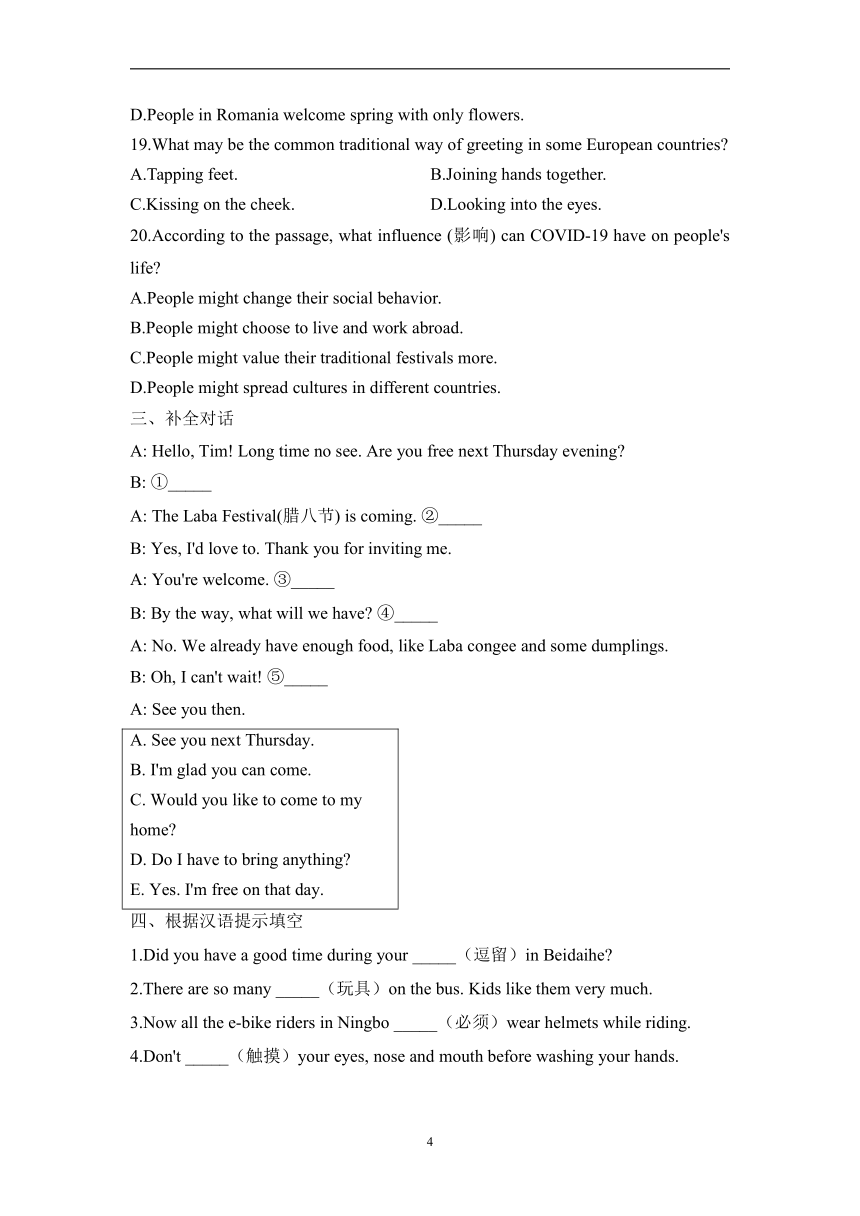2023-2024学年外研版英语八年级上册周周练(Module 11含解析)
文档属性
| 名称 | 2023-2024学年外研版英语八年级上册周周练(Module 11含解析) |

|
|
| 格式 | docx | ||
| 文件大小 | 31.7KB | ||
| 资源类型 | 教案 | ||
| 版本资源 | 外研版 | ||
| 科目 | 英语 | ||
| 更新时间 | 2023-09-10 13:29:33 | ||
图片预览




文档简介
Module 11——2023-2024学年外研版英语八年级上册周周练
一、单项选择
1.Come on! Just walk ______ the platform(讲台)and begin your speech.
A.in B.into C.at D.onto
2.Bill likes to play _____ chess, but his sister likes to play _____ piano.
A./; a B./the C.the; the D.the; a
3.—The cheese doesn't _____ good. Why don't we go to buy some fresh cheese
—Sounds great!
A. see B. find C. sound D. taste
4.—You must be very hungry now.
—Yes, I'm ready to do some _____ eating.
A.serious B.healthy C.local D.extra
5.—_____is waiting for you at the school gate, Lucy.
—Thank you, but who can it be
A.Anyone B.Nobody C.Someone D.Everyone
6.—The article says that one's animal sign can decide his personality (性格) .
—You _____ read it for fun, but don't believe in that.
A.can B.must C.shouldn't D.needn't
7.He had much _____ as an engineer, so he was chosen as the group leader.
A.interest B.service C.experience D.attention
8.You _____ set out alone, or you _____ get lost in the jungle(丛林)。
A.needn't; may B.mustn't; might C.can't; need D.mustn't; must
9.—Here's a present for you. Happy birthday, Sweetie! Open it.
—Wow! An iWatch _____! Thank you so much, Dad!
A.What a surprise B.What surprise C.What a waste D.What waste
10.The poor family _____ a lot of money from those kind-hearted people, but they didn't _____ it because they want to make money on their own.
A.received; receive B.accepted; accept
C.received; accept D.accepted; receive
二、阅读理解
A
China is a nation of etiquette (礼仪) . Chinese people are among the most hospitable people in the world. If foreigners visit a Chinese family, they would be surprised at the warmth that they would receive as guests.
When you visit a Chinese family, the host usually makes tea for you. Then he will serve you snacks (小吃) like biscuits or candy. Someone in the family will also chat with you, never letting you feel lonely.
At the same time, other family members will prepare a meal for you. Chinese people treat (款待) their guests with a big meal. They always present more food than the guests can eat. On the table, the guests must be the first to eat. Perhaps one of the things that surprise Western guests most is that the Chinese host likes to pick food for visitors, which won't happen at Western tables. The Chinese family go out of their way to make you feel at home. As you finish eating, the host usually says, "It seems that you didn't eat much. Please have more." Although you tell them you are full, they still put more food in your bowl.
Being warm and hospitable has long been an important part of Chinese culture and tradition. As Confucius (孔子) said thousands of years ago:
To meet friends from afar
How happy we are!
11.The underlined word "hospitable" means "______"in this passage.
A.friendly B.honest C.modern D.smart
12.Which of the following is NOT mentioned in the passage
A.The Chinese host will serve visitors snacks.
B.Someone in the Chinese family will talk with visitors.
C.The Chinese family will dance with visitors.
D.The Chinese host likes to pick food for visitors.
13.What the Chinese family do for the guests is to ______.
A.show their nice food B.show their wealth
C.make them healthy D.make them feel at home
14.What's the meaning of the words by Confucius at the end of the passage
A.学而时习之, 不亦说乎 B.有朋自远方来, 不亦乐乎
C.人不知而不愠, 不亦君子乎 D.己所不欲, 勿施于人。
15.The passage mainly tells us about ______.
A.what food Chinese people like to eat
B.why Chinese people invite the guests to their home
C.how Chinese people treat the guests
D.where Chinese people usually go
B
The COVID-l9 outbreak is changing people's traditional habits such as greetings and customs. People in different countries have had some new and creative (创造性的) choices. Knowing about this could help us understand their cultures and communicate (交流) with each other.
France Newspapers have been full of advice on how to replace (取代) handshaking and kissing on the cheek. Now looking into a person's eyes can be seen as a greeting.
Romania Martisor Festival (三月节) is a sign of the beginning of spring when the flowers and talismans (护身符) are handed out. But the government has told people to hand over the flowers and talismans without kissing.
China People are called on to greet each other through the Internet and not to get together if possible. They can join their hands together as a sign of greetings when they meet, but no shaking hands.
Australia It is better not to shake hands. People can give each other a pat on the back. "I won't say 'Don't kiss', but you could be exercising a degree of care with whom you choose to kiss, " said an officer.
16.How are Chinese people called on to greet each other
A.By greeting online. B.By handing out talismans.
C.By tapping feet. D.By touching on the shoulder.
17.In which country are people advised to pat others on the back
A.China. B.France. C.Romania. D.Australia.
18.Which of the following is TRUE
A.Nobody wears masks on Martisor Festival.
B.People in China or France are called on not to shake hands.
C.Kissing is not allowed in Australia now.
D.People in Romania welcome spring with only flowers.
19.What may be the common traditional way of greeting in some European countries
A.Tapping feet. B.Joining hands together.
C.Kissing on the cheek. D.Looking into the eyes.
20.According to the passage, what influence (影响) can COVID-19 have on people's life
A.People might change their social behavior.
B.People might choose to live and work abroad.
C.People might value their traditional festivals more.
D.People might spread cultures in different countries.
三、补全对话
A: Hello, Tim! Long time no see. Are you free next Thursday evening
B: ①_____
A: The Laba Festival(腊八节) is coming. ②_____
B: Yes, I'd love to. Thank you for inviting me.
A: You're welcome. ③_____
B: By the way, what will we have ④_____
A: No. We already have enough food, like Laba congee and some dumplings.
B: Oh, I can't wait! ⑤_____
A: See you then.
A. See you next Thursday. B. I'm glad you can come. C. Would you like to come to my home D. Do I have to bring anything E. Yes. I'm free on that day.
四、根据汉语提示填空
1.Did you have a good time during your _____(逗留)in Beidaihe
2.There are so many _____(玩具)on the bus. Kids like them very much.
3.Now all the e-bike riders in Ningbo _____(必须)wear helmets while riding.
4.Don't _____(触摸)your eyes, nose and mouth before washing your hands.
5.Jack comes from America, but he knows many ______ (传统) folk stories about Chinese festivals.
五、书面表达
假设你是李华,你的英国朋友Tony对“中国红”一词很感兴趣,想了解"中国红"在中国人日常生活中的体现,请你根据以下表格信息写一封回信帮助他了解。
地位 最受欢迎的颜色之一
代表 幸福、可以带来好运
使用场所 婚礼、春节等
表达方式 剪纸、中国结、红包、灯笼
提示词:婚礼 wedding,中国结Chinese knots,红包red packets,代表stand for
Dear Tony,
It's great to receive your letter. I'm writing to tell you something about Chinese red.
_______________________________________________________________________________________________________________________________________________________________________________________________________________
I truly hope my letter will help you understand better about Chinese red.
Yours,
Li Hua
答案以及解析
一、单项选择
1.答案:D
解析:由"the platform(讲台)"可知此处指"走到讲台上",故用onto"到……上面"。in"在……里面";into"到……里面";at"在"。
2.答案:B
解析:play后跟棋类名词时,该名词前不加冠词;play后跟乐器类名词时,该名词前加 the。
3.答案:D
解析:考查动词词义辨析。句意:—这块奶酪尝起来不好。我们为什么不去买一些新鲜的奶酪呢 —听起来很棒!A项意为“看见”;B项意为“找到”;C项意为“听起来”;D项意为“尝起来”。根据句意可知应选D。
4.答案:A
解析:考查形容词辨析。serious 意为“认真的”;healthy 意为“健康的”;local意为“当地的”;extra意为“额外的”。根据“Yes”可知serious符合语境。故选A。
5.答案:C
解析:此处表示肯定,泛指某人,故用Someone。
6.答案:A
解析:—这篇文章说一个人的生肖可以决定他的性格。—你可以为了好玩而读一读,但不要相信那个。根据语境,尤其是空后的"but don't believe in that"可知,此处应用情态动词can表示许可。
7.答案:C
解析:句意:作为一名工程师,他经验丰富,所以他被选为组长。interest"兴趣";service"服务";experience"经验";attention"注意力"。由后半句可知选C。
8.答案:B
解析:句意:你不可以单独出发,否则你可能会在丛林中迷路。根据第二空后的内容可知,第一空要用mustn't,意为"不可以,禁止";第二空要用might,此处might表示推测,意为"可能"。
9.答案:A
解析:surprise作名词时意为"惊喜",是可数名词,其前应用不定冠词a;waste意为"浪费",不符合语境。故选A。
10.答案:C
解析:由but可知前后两部分之间为转折关系,第一空表示客观上收到,故用received; accept表示主观上接受,且第二空前有didn't,故第二空用accept。
二、阅读理解
A
11.答案:A
解析:词义猜测题。画线的词是hospitable,结合上下文可推断,中国人是世界上最"热情友好的"人之一,故答案为A。
12.答案:C
解析:细节理解题。通读第二、三段可知,C项未在文中提及。
13.答案:D
解析:细节理解题。由第三段中的"The Chinese family go out of their way to make you feel at home"可知答案为D。
14.答案:B
解析:句意理解题。通读全文可推断,孔子的那句话意思为"有朋自远方来,不亦乐乎?"。故答案为B。
15.答案:C
解析:主旨大意题。通读全文可知,本文主要围绕中国人如何招待客人这一话题展开叙述,故C项最符合文章大意。
B
16.答案:A
解析:细节理解题。根据 China部分第一句"People are called on to greet each other through the Internet"可知答案为A。
17.答案:D
解析:细节理解题。根据Australia部分第二句"People can give each other a pat on the back"可知答案。
18.答案:B
解析:推理判断题。根据China部分中的"but no shaking hands"和France部分中的"replace(取代)handshaking"可推断,在中国和法国都不建议握手,故选项B是正确的描述。
19.答案:C
解析:推理判断题。根据 Romania部分中的"But the government has told people to hand over the flowers and talismans without kissing"和France 部分中"Newspapers have been full of advice on how to replace(取代)handshaking and kissing on the cheek"可推断,在一些欧洲国家,亲吻脸颊是常见的传统的问候方式,故答案为C。
20.答案:A
解析:推理判断题。通读全文可推断,新型冠状病毒肺炎疫情对人们生活的影响体现在"人们可能会改变他们的社交行为",故答案为A。
三、补全对话
答案:ECBDA
解析:①根据问句“你下周四晚上有空吗 ”可知,所缺的答语是E。
②根据答语中的“Yes, I'd love to.”可知,所缺的问句是Would you like... 的邀请句型,故答案为C。
③根据上下文可知所缺的句子是B,该句的含义是“我很高兴你能来”。
④根据答语中的“不需要,我们已经有足够的食物”可知,所缺的问句是D。
⑤根据下文“See you then.”可知,此处所缺的句子是A,该句的含义是“下周四见”。
四、根据提示填空
1.答案:stay
2.答案:toys
3.答案:must
4.答案:touch
5.答案:traditional
五、书面表达
Dear Tony,
It's great to receive your letter. I'm writing to tell you something about Chinese red.
As we all know, Chinese red is one of the most popular colors in China, and it is deeply loved by people of all ages. The reason why Chinese people love red is that it stands for happiness and fortune. What's more, it can bring people good luck as well. When the traditional Chinese Spring Festival is coming, Chinese red will come into your eyes whenever and wherever you are. When you attend someone's wedding ceremony, what impresses you most is Chinese red. On these occasions, Chinese red is put into many things, such as paper cuttings, Chinese knots, red packets and lanterns.
Chinese red has deeply affected every Chinese person. It is not only a color but also a kind of Chinese spirit and culture.
I truly hope my letter will help you understand better about Chinese red.
Yours,
Li Hua
2
一、单项选择
1.Come on! Just walk ______ the platform(讲台)and begin your speech.
A.in B.into C.at D.onto
2.Bill likes to play _____ chess, but his sister likes to play _____ piano.
A./; a B./the C.the; the D.the; a
3.—The cheese doesn't _____ good. Why don't we go to buy some fresh cheese
—Sounds great!
A. see B. find C. sound D. taste
4.—You must be very hungry now.
—Yes, I'm ready to do some _____ eating.
A.serious B.healthy C.local D.extra
5.—_____is waiting for you at the school gate, Lucy.
—Thank you, but who can it be
A.Anyone B.Nobody C.Someone D.Everyone
6.—The article says that one's animal sign can decide his personality (性格) .
—You _____ read it for fun, but don't believe in that.
A.can B.must C.shouldn't D.needn't
7.He had much _____ as an engineer, so he was chosen as the group leader.
A.interest B.service C.experience D.attention
8.You _____ set out alone, or you _____ get lost in the jungle(丛林)。
A.needn't; may B.mustn't; might C.can't; need D.mustn't; must
9.—Here's a present for you. Happy birthday, Sweetie! Open it.
—Wow! An iWatch _____! Thank you so much, Dad!
A.What a surprise B.What surprise C.What a waste D.What waste
10.The poor family _____ a lot of money from those kind-hearted people, but they didn't _____ it because they want to make money on their own.
A.received; receive B.accepted; accept
C.received; accept D.accepted; receive
二、阅读理解
A
China is a nation of etiquette (礼仪) . Chinese people are among the most hospitable people in the world. If foreigners visit a Chinese family, they would be surprised at the warmth that they would receive as guests.
When you visit a Chinese family, the host usually makes tea for you. Then he will serve you snacks (小吃) like biscuits or candy. Someone in the family will also chat with you, never letting you feel lonely.
At the same time, other family members will prepare a meal for you. Chinese people treat (款待) their guests with a big meal. They always present more food than the guests can eat. On the table, the guests must be the first to eat. Perhaps one of the things that surprise Western guests most is that the Chinese host likes to pick food for visitors, which won't happen at Western tables. The Chinese family go out of their way to make you feel at home. As you finish eating, the host usually says, "It seems that you didn't eat much. Please have more." Although you tell them you are full, they still put more food in your bowl.
Being warm and hospitable has long been an important part of Chinese culture and tradition. As Confucius (孔子) said thousands of years ago:
To meet friends from afar
How happy we are!
11.The underlined word "hospitable" means "______"in this passage.
A.friendly B.honest C.modern D.smart
12.Which of the following is NOT mentioned in the passage
A.The Chinese host will serve visitors snacks.
B.Someone in the Chinese family will talk with visitors.
C.The Chinese family will dance with visitors.
D.The Chinese host likes to pick food for visitors.
13.What the Chinese family do for the guests is to ______.
A.show their nice food B.show their wealth
C.make them healthy D.make them feel at home
14.What's the meaning of the words by Confucius at the end of the passage
A.学而时习之, 不亦说乎 B.有朋自远方来, 不亦乐乎
C.人不知而不愠, 不亦君子乎 D.己所不欲, 勿施于人。
15.The passage mainly tells us about ______.
A.what food Chinese people like to eat
B.why Chinese people invite the guests to their home
C.how Chinese people treat the guests
D.where Chinese people usually go
B
The COVID-l9 outbreak is changing people's traditional habits such as greetings and customs. People in different countries have had some new and creative (创造性的) choices. Knowing about this could help us understand their cultures and communicate (交流) with each other.
France Newspapers have been full of advice on how to replace (取代) handshaking and kissing on the cheek. Now looking into a person's eyes can be seen as a greeting.
Romania Martisor Festival (三月节) is a sign of the beginning of spring when the flowers and talismans (护身符) are handed out. But the government has told people to hand over the flowers and talismans without kissing.
China People are called on to greet each other through the Internet and not to get together if possible. They can join their hands together as a sign of greetings when they meet, but no shaking hands.
Australia It is better not to shake hands. People can give each other a pat on the back. "I won't say 'Don't kiss', but you could be exercising a degree of care with whom you choose to kiss, " said an officer.
16.How are Chinese people called on to greet each other
A.By greeting online. B.By handing out talismans.
C.By tapping feet. D.By touching on the shoulder.
17.In which country are people advised to pat others on the back
A.China. B.France. C.Romania. D.Australia.
18.Which of the following is TRUE
A.Nobody wears masks on Martisor Festival.
B.People in China or France are called on not to shake hands.
C.Kissing is not allowed in Australia now.
D.People in Romania welcome spring with only flowers.
19.What may be the common traditional way of greeting in some European countries
A.Tapping feet. B.Joining hands together.
C.Kissing on the cheek. D.Looking into the eyes.
20.According to the passage, what influence (影响) can COVID-19 have on people's life
A.People might change their social behavior.
B.People might choose to live and work abroad.
C.People might value their traditional festivals more.
D.People might spread cultures in different countries.
三、补全对话
A: Hello, Tim! Long time no see. Are you free next Thursday evening
B: ①_____
A: The Laba Festival(腊八节) is coming. ②_____
B: Yes, I'd love to. Thank you for inviting me.
A: You're welcome. ③_____
B: By the way, what will we have ④_____
A: No. We already have enough food, like Laba congee and some dumplings.
B: Oh, I can't wait! ⑤_____
A: See you then.
A. See you next Thursday. B. I'm glad you can come. C. Would you like to come to my home D. Do I have to bring anything E. Yes. I'm free on that day.
四、根据汉语提示填空
1.Did you have a good time during your _____(逗留)in Beidaihe
2.There are so many _____(玩具)on the bus. Kids like them very much.
3.Now all the e-bike riders in Ningbo _____(必须)wear helmets while riding.
4.Don't _____(触摸)your eyes, nose and mouth before washing your hands.
5.Jack comes from America, but he knows many ______ (传统) folk stories about Chinese festivals.
五、书面表达
假设你是李华,你的英国朋友Tony对“中国红”一词很感兴趣,想了解"中国红"在中国人日常生活中的体现,请你根据以下表格信息写一封回信帮助他了解。
地位 最受欢迎的颜色之一
代表 幸福、可以带来好运
使用场所 婚礼、春节等
表达方式 剪纸、中国结、红包、灯笼
提示词:婚礼 wedding,中国结Chinese knots,红包red packets,代表stand for
Dear Tony,
It's great to receive your letter. I'm writing to tell you something about Chinese red.
_______________________________________________________________________________________________________________________________________________________________________________________________________________
I truly hope my letter will help you understand better about Chinese red.
Yours,
Li Hua
答案以及解析
一、单项选择
1.答案:D
解析:由"the platform(讲台)"可知此处指"走到讲台上",故用onto"到……上面"。in"在……里面";into"到……里面";at"在"。
2.答案:B
解析:play后跟棋类名词时,该名词前不加冠词;play后跟乐器类名词时,该名词前加 the。
3.答案:D
解析:考查动词词义辨析。句意:—这块奶酪尝起来不好。我们为什么不去买一些新鲜的奶酪呢 —听起来很棒!A项意为“看见”;B项意为“找到”;C项意为“听起来”;D项意为“尝起来”。根据句意可知应选D。
4.答案:A
解析:考查形容词辨析。serious 意为“认真的”;healthy 意为“健康的”;local意为“当地的”;extra意为“额外的”。根据“Yes”可知serious符合语境。故选A。
5.答案:C
解析:此处表示肯定,泛指某人,故用Someone。
6.答案:A
解析:—这篇文章说一个人的生肖可以决定他的性格。—你可以为了好玩而读一读,但不要相信那个。根据语境,尤其是空后的"but don't believe in that"可知,此处应用情态动词can表示许可。
7.答案:C
解析:句意:作为一名工程师,他经验丰富,所以他被选为组长。interest"兴趣";service"服务";experience"经验";attention"注意力"。由后半句可知选C。
8.答案:B
解析:句意:你不可以单独出发,否则你可能会在丛林中迷路。根据第二空后的内容可知,第一空要用mustn't,意为"不可以,禁止";第二空要用might,此处might表示推测,意为"可能"。
9.答案:A
解析:surprise作名词时意为"惊喜",是可数名词,其前应用不定冠词a;waste意为"浪费",不符合语境。故选A。
10.答案:C
解析:由but可知前后两部分之间为转折关系,第一空表示客观上收到,故用received; accept表示主观上接受,且第二空前有didn't,故第二空用accept。
二、阅读理解
A
11.答案:A
解析:词义猜测题。画线的词是hospitable,结合上下文可推断,中国人是世界上最"热情友好的"人之一,故答案为A。
12.答案:C
解析:细节理解题。通读第二、三段可知,C项未在文中提及。
13.答案:D
解析:细节理解题。由第三段中的"The Chinese family go out of their way to make you feel at home"可知答案为D。
14.答案:B
解析:句意理解题。通读全文可推断,孔子的那句话意思为"有朋自远方来,不亦乐乎?"。故答案为B。
15.答案:C
解析:主旨大意题。通读全文可知,本文主要围绕中国人如何招待客人这一话题展开叙述,故C项最符合文章大意。
B
16.答案:A
解析:细节理解题。根据 China部分第一句"People are called on to greet each other through the Internet"可知答案为A。
17.答案:D
解析:细节理解题。根据Australia部分第二句"People can give each other a pat on the back"可知答案。
18.答案:B
解析:推理判断题。根据China部分中的"but no shaking hands"和France部分中的"replace(取代)handshaking"可推断,在中国和法国都不建议握手,故选项B是正确的描述。
19.答案:C
解析:推理判断题。根据 Romania部分中的"But the government has told people to hand over the flowers and talismans without kissing"和France 部分中"Newspapers have been full of advice on how to replace(取代)handshaking and kissing on the cheek"可推断,在一些欧洲国家,亲吻脸颊是常见的传统的问候方式,故答案为C。
20.答案:A
解析:推理判断题。通读全文可推断,新型冠状病毒肺炎疫情对人们生活的影响体现在"人们可能会改变他们的社交行为",故答案为A。
三、补全对话
答案:ECBDA
解析:①根据问句“你下周四晚上有空吗 ”可知,所缺的答语是E。
②根据答语中的“Yes, I'd love to.”可知,所缺的问句是Would you like... 的邀请句型,故答案为C。
③根据上下文可知所缺的句子是B,该句的含义是“我很高兴你能来”。
④根据答语中的“不需要,我们已经有足够的食物”可知,所缺的问句是D。
⑤根据下文“See you then.”可知,此处所缺的句子是A,该句的含义是“下周四见”。
四、根据提示填空
1.答案:stay
2.答案:toys
3.答案:must
4.答案:touch
5.答案:traditional
五、书面表达
Dear Tony,
It's great to receive your letter. I'm writing to tell you something about Chinese red.
As we all know, Chinese red is one of the most popular colors in China, and it is deeply loved by people of all ages. The reason why Chinese people love red is that it stands for happiness and fortune. What's more, it can bring people good luck as well. When the traditional Chinese Spring Festival is coming, Chinese red will come into your eyes whenever and wherever you are. When you attend someone's wedding ceremony, what impresses you most is Chinese red. On these occasions, Chinese red is put into many things, such as paper cuttings, Chinese knots, red packets and lanterns.
Chinese red has deeply affected every Chinese person. It is not only a color but also a kind of Chinese spirit and culture.
I truly hope my letter will help you understand better about Chinese red.
Yours,
Li Hua
2
同课章节目录
- Module 1 How to learn English
- Unit 1 Let's try to speak English as much as possi
- Unit 2 You should smile at her.
- Unit 3 Language in use .
- Module 2 My home town and my country
- Unit 1 It's taller than many other buildings.
- Unit 2 Cambridge is a beautiful city in the east o
- Unit 3 Language in use .
- Module 3 Sports.
- Unit 1 Nothing is more exciting than playing tenni
- Unit 2 This year we training more carefully.
- Unit 3 Language in use .
- Module 4 Planes, ships and trains .
- Unit 1 He lives the farthest from school.
- Unit 2 What is the best way to travel.
- Unit 3 Language in use .
- Module 5 Lao She Teahouse.
- Unit 1 I wanted to see the Beijing Opera.
- Unit 2 It descibes the changes in Chinese society.
- Unit 3 Language in use .
- Module 6 Animals in danger.
- Unit 1 It allows people to get closer to them .
- Unit 2 The WWF is working hard to save them all.
- Unit 3 Language in use .
- Revision module A
- Module 7 A famous story
- Unit 1 Alice was sitting with her sister by the ri
- Unit 2 She was thinking about her cat.
- Unit 3 Language in use .
- Module 8 Accidents
- Unit 1 While the car were changing to red, a car s
- Unit 2 I was trying to pick it up when it bite me
- Unit 3 Language in use .
- Module 9 Population
- Unit 1 The population of China is about 1.37 billi
- Unit 2 Arnwick was a city with 200,000 people.
- Unit 3 Language in use .
- Module 10 The weathe
- Unit 1 It might snow.
- Unit 2 The weather is fine all year round.
- Unit 3 Language in use .
- Module 11 Way of life
- Unit 1 In China ,we open a gift later.
- Unit 2 In England, you usually drink tea with milk
- Unit 3 Language in use .
- Module 12 Help
- Unit 1 What should we do before help arrives?
- Unit 2 Stay away from windows and heavy furniture.
- Unit 3 Language in use .
- Revision module B
